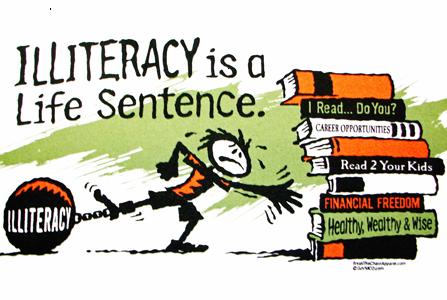
*UNEMPLOYMENT cuases of POVERTY
*POOR HEALTH cuases of POVERTY
ILLITERACY as a cuase of POVERTY
Illiteracy may be defined as 'the condition of being unable to read or write' and it is one of the main causes of poverty in any society, and Pakistan unfortunately. According to the 1998 census the definition of literacy is 'one who can read a newspaper and write a simple letter, in any language'.
Illiteracy contributes to poverty in numerous ways, both indirect and direct. The first link between illiteracy and poverty tends to be when the poor man is unable to afford a high quality education and this in turn prevents him from getting a high-paid job.
This may also lead to other causes of poverty. When the poor man can't make ends meet with his meager income then he is forced to send his children to work. These children should instead be going to schools and getting education so that when they grow old they can get a higher-earning job and improve their standard of living. This cycle may continue for many generations to come and the poverty stricken people may not be able to improve on their style of living
Another way that illiteracy leads to poverty is that it alienates a person from his rights. An illiterate person isn't aware of his rights, and so he can be easily manipulated and exploited by the 'bourgeoisie'. If it happens on a large scale and these people are forced to work for jobs with very low incomes, the poverty levels in the country increase.
------
The Relation of ILLITERACY to POVERTY
The relationship between literacy levels and the generational eradication of poverty is well documented in the press, in social studies texts, in statistician reports, and in the intangible minds of most socio-economic theorists and political science majors. Governments have adopted literacy programmes that will, it is purported, wipe extreme poverty clean off the face of the earth. World institutes, such as the UN, have begun to implement long range plans that address the literacy issue, and individual countries have followed suit.
The United Nations well thought out Millennium Goals have produced great interest in alleviating extreme poverty from the globe in diminishing the number of people who live on less than one dollar a day by half by 2015, achieving "full", "productive", and "decent" employment opportunities for all by the same year, and halving the number of people suffering from hunger in the world.
(http://poverty2.forumone.com/library/view/8673) Djibouti on the horn of Africa reveals a very common fact: "Households with lower levels of education are at a higher risk of being poor" This seems obvious, however, statistical data suggest a significant
increase in educations effect on family economy. "a one-year increase in the average education of the household reduces the probability of the household being poor by six percentage points." Given the average student spends five years in school, normally from, say, the age of nine to about fourteen, depending upon economic realities, this translates into a 30% decrease in the "probability of the household being poor".
The real problem, though, is simple. The poor are expected to pay for that which they cannot, or they rely on governments who do not have to do the same. What results is a heavy reliance on outside forces. From the same source, it states that Djibouti, and no doubt nations in a similar predicament (e.g. Burkino Faso), must either seek "community based management" (i.e. decentralized education) or the private sector. Both have potential pitfalls as governments hand over the education of its people to others.
Education can certainly help people get out of their situations and provides opportunity where there wasn't any before, but education is not the cure-all. Literacy, often as a part of education, is a way to learn (emphasis on the singular "a"), but it is not "the" way to learn. There is a systematic arrogance that exists when the "literacy myth" is forwarded on to the next generation of scholars.In this mythical world, "economic mobility is touted as the result of literacy acquisition when, in reality, race and gender play a greater role in shaping an individual's economic prospects. Without the availability of jobs that pay a living wage, literacy education loses its value and appeal." (Corley, 2003)
SOURCE: Earl Demott- Created on: April 21, 2008
-----
Why is the Illiteracy Rate So High?
Most people have a certain amount of compassion for those in poverty among us. You've perhaps heard the saying, "Give a man a fish, and you've fed him for a day. Teach a man to fish, and you've fed him for a lifetime." With that in mind, how can we be of most help to functional illiterates? Quite obviously, we need to know why they are functionally illiterate. Many people blame the illiterate for his or her illiteracy. We often think that if someone does not learn to read it is because they are not trying hard enough or because they are not smart enough. Is that really true? Teachers, politicians, and the media want that to be true because they do not know what to do about the problem.

